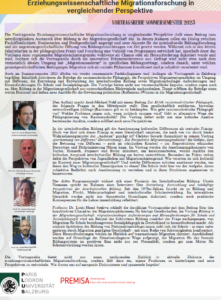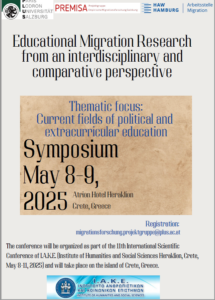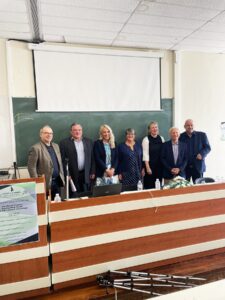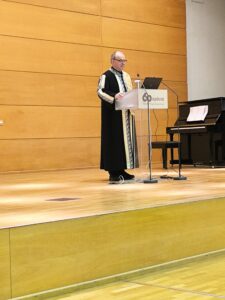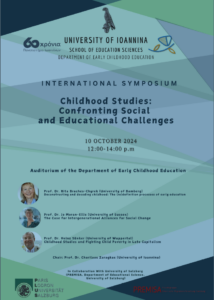Neugründung

Präambel
Die Abteilung Bildungs- und Professionsforschung als Organisationseinheit am FB-Erziehungswissenschaft richtet nach § 118, 119 und 120 der Satzung der Universität Salzburg den Kurs: „Hellenic Studies ‚Gaberell & Angeliki Drachman‘“ zur wissenschaftlichen Weiterbildung ein. Verantwortlich für die wissenschaftliche, wirtschaftliche und organisatorische Durchführung des Kurses ist Univ. Prof. Dr. Wassilios Baros.
1. Inhalt des Kurses und didaktischer Ansatz
Der Kurs „Hellenic Studies ‚Gaberell & Angeliki Drachman‘“ vermittelt einen umfassenden Einblick in Sprache, Kultur und Geschichte Griechenlands. Der Kurs versteht sich als Kulturgeschichtlich Integrierter Sprachunterricht, wobei allgemeinbildende Inhalte aus Literatur, Linguistik, Geschichte und Volkskunde didaktisch zum Ausgangspunkt für den Erwerb der neugriechischen Sprache gemacht werden. Die methodische Grundlage dieses didaktischen Ansatzes bildet das inhaltlich-kulturelle Sprachenlernen (content-based language learning) (Dalton-Puffer, C. (2007), das die Sprachkompetenz in den Zusammenhang historischer und kultureller Themen stellt. Durch die enge Verzahnung von Sprache und Allgemeinbildung erleben die Teilnehmerinnen und Teilnehmer die zu erlernende neue Sprache als ein ihnen (zumindest partiell) bereits vertrautes, lebendiges Ausdrucksmittel. Ausgewählte inhaltliche Schwerpunkte bilden u.a.: Etymologie und Wortschatzkunde, Herkunft von Begrifflichkeiten, Phraseologismen (griechische Ursprünge europäischer Begriffe und Redensarten) und wissenschaftlichen (u.a. auch naturwissenschaftlichen oder medizinischen) Fachtermini, Rezeption der altgriechischen Autoren (Homers Ilias und Odyssee als Basis europäischer Literatur), Olympische Spiele (historische Entwicklung und kulturelle Bedeutung), Mythologie (zentrale Legenden und deren kulturelle Wirkung), Belletristik (von der Antike bis zur neugriechischen Gegenwart), Theater, und Volkskunde (Dramen, Feste, kulturelle Traditionen, Musik (Liedertexte) und – last but not least – Begriffe der kulinarischen Traditionen und der Essenskultur.
Der Kurs legt Wert auf aktive Beteiligung, Reflexion und die Verbindung zu herkömmlichen sowie aktuellen kulturellen Gegebenheiten. So werden sprachliche Fähigkeiten, kulturelles Wissen, kritisches Denken und interkulturelle Kompetenz zugleich vernetzt und gefördert.
Konkret bedeutet dieser Ansatz: Wortschatz und Grammatik werden anhand authentischer Themen (Mythologie, Literatur, olympische Spiele) vermittelt. Lesetexte und Sprachübungen stammen direkt (bzw. geringfügig adaptiert) aus literarischen oder historischen Quellen. Diskussionsrunden und kreative Aufgaben regen den Transfer des Wissens an.
Eine Besonderheit stellt die Zusammenarbeit mit dem Bildungslaborprojekt MECLES dar, das sich an Kinder und Jugendliche richtet. In MECLES werden die Inhalte und der didaktische Ansatz des Kurses „Hellenic Studies – „Gaberell & Angeliki Drachman““ adaptiert und spezifisch auf eine jüngere Zielgruppe übertragen. Dadurch wird eine nachhaltige Förderung griechischer Sprache und Kultur über alle Altersstufen hinweg ermöglicht.
2. Lehrende
Dr. Ioannis Fykias (CO-COORDINATOR des Kurses)
Studium der englischen und griechischen Philologie an der Universität Athen (1976-1980). Doktorat aus theoretischer Linguistik an der PLUS (1988); Lektor (1986 -2024) und Universitätsassistent (1992-2024) am FB Linguistik der Universität Salzburg , (Vorlesungen aus allgemeiner und historisch-vergleichender Sprachwissenschaft: Grundlagen der Linguistik, Sprachwandel, Theoretische und diachrone Syntax, komparative Syntax der germanischen und der südosteuropäischen Sprachen, morphologische und syntaktische Typologie, Geschichte der griechischen Sprache, Bilingualismus und Zweitspracherwerb, Kontrastive Linguistik, Balkanlinguistik, Typologie, Übersetzungstheorie; Sprachstrukturkurse: Altgriechisch, Neugriechisch, Albanisch, südosteuropäische Sprachen);
Theodora Gabrani, M.A.
Kulturwissenschaftlerin mit Schwerpunkt griechische Geschichte und Volkskunde. Verantwortlich für die Module Mythologie, olympische Spiele, Theatergeschichte und Volkskunde.
Dr. Christina Katsikadeli
Studium der deutschen und griechischen Philologie an der Universität Athen. Doktorat aus allgemeiner und historisch vergleichender Linguistik an der PLUS. Allgemeine & historische Sprachwissenschaft (Indogermanistik), Syntax, Morphologie, Semantik, Bilingualismus/Mehrsprachigkeit, Sprachkontakt (insbes. Balkan, östliches Mittelmeer), Fachsprachen und Terminologie, Historische Lexikographie, Zweitspracherwerb.
3. Module
Modul 1 „Basic“: Neugriechisch für den Alltag
Modul 2 „Etymol“: Neugriechisch über Etymologie und Sprachgeschichte
Modul 3 „Classic“: Wissenschaftliche Terminologie im Neugriechischen
Modul 4 „Diploma“: Prüfungsvorbereitung auf Sprachzertifikate
Aktuelle Informationen über PREMISA im Facebook hier
Symposion
Impulse zu aktuellen Herausforderungen und Perspektiven für transdisziplinäre Bildungsforschung mit Blick auf Nachhaltigkeit
DSP-Kolleg Globale Kompetenz, Futures Literacy und Professionalität in der globalen Migrationsgesellschaft (GLOKFUL)
11. November 2025
Hörsaal Agnes Muthspiel, Unipark Nonntal Salzburg
15:00–18:00 Uhr
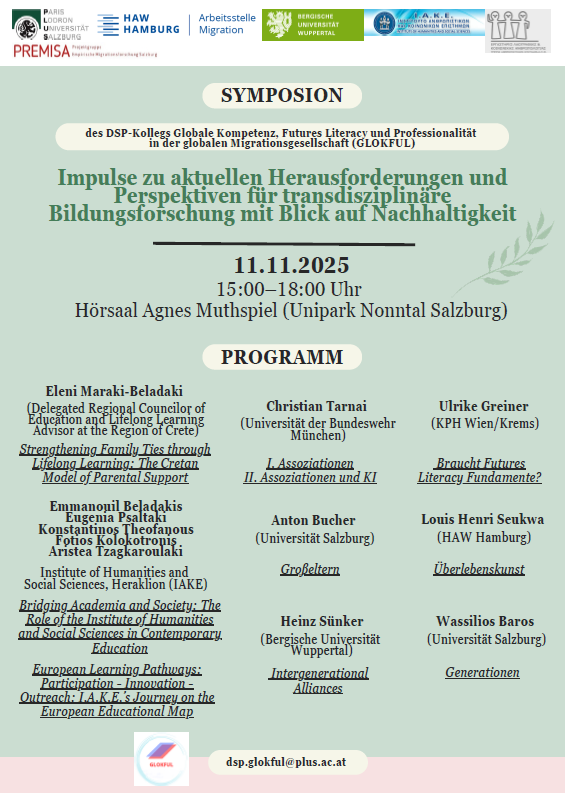
Programm
VORTRAGSREIHE SOMMERSEMESTER 2025
Erziehungswissenschaftliche Migrationsforschung
in vergleichender Perspektive
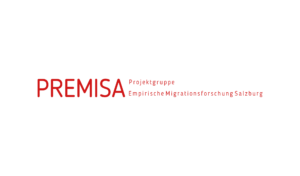
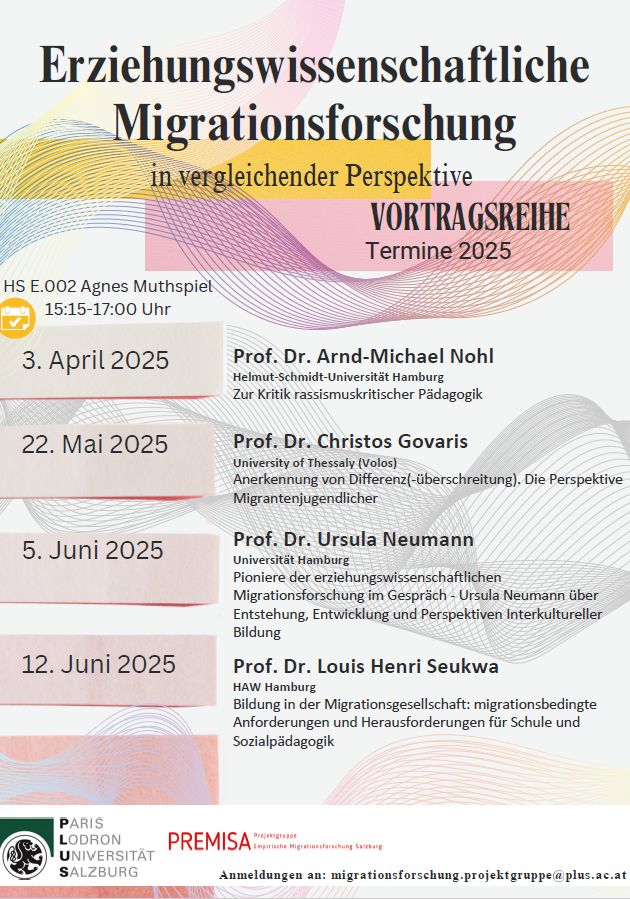
Die Vortragsreihe Erziehungswissenschaftliche Migrationsforschung in vergleichender Perspektive stellt einen Beitrag zuminterdisziplinären Austausch über Bildung in der Migrationsgesellschaft dar. In diesem Rahmen sollen ein Dialog zwischen Fachöffentlichkeit, Studierenden und Stadtgesellschaft angeregt und neue Akzente für die interkulturelle Bildungsforschungund die migrationsgesellschaftliche Öffnung von Bildungseinrichtungen vor Ort gesetzt werden. Während sich in den letzten Jahr(zehnt)en in der pädagogischen Praxis und Forschung eine Vielzahl von Programmen entwickelt hat, innerhalb derer dasVorliegen eines sogenannten Migrationshintergrundes wahlweise als Chance oder als Herausforderung diskutiert wurde undwird, zeichnet sich die Vortragsreihe durch ein innovatives Erkenntnisinteresse aus: Gefragt wird nicht etwa nach demvermeintlich idealen Umgang mit „Migrationsanderen“ in spezifischen Bildungssettings, sondern danach, unter welchengesamtgesellschaftlichen Bedingungen Migration sich als soziales Phänomen konstituiert und je subjektiv verarbeitet wird.
Auch im Sommersemester 2025 dürfen wir wieder renommierte Fachkolleginnen und -kollegen als Vortragende in Salzburg begrüßen. Inhaltlich diskutieren die Beiträge die rassismuskritische Pädagogik, die Perspektiven Migrantenjugendlicher im Umgangmit Differenz, die Entstehung und Entwicklung der interkulturellen Bildung sowie Migrationsbedingte Anforderungen undHerausforderungen für Schule und Sozialpädagogik.
Die Vorträge bieten nicht nur wissenschaftliche Impulse, sondern regen auchan, über Bildung in der Migrationsgesellschaft aus unterschiedlichen Blickwinkeln nachzudenken. Damit eröffnen die Beiträge einenweiten Horizont und liefern neue Anstöße für die Gewinnung politischen (Reflexions-)Wissens in der Migrationsgesellschaft.
Die Vortragsreihe bietet nicht nur einen umfassenden Einblick in aktuelle Diskurse der erziehungswissenschaftlichen Migrationsforschung, sondern lädt dazu ein, eigene Positionen zu hinterfragen und neue Perspektiven zu entwickeln.
Wir freuen uns auf anregende Diskussionen und spannende Impulse!
……………………………………………………………………………………………………………………………………
Symposion
Erziehungswissenschaftliche Migrationsforschung
in interdisziplinärer und vergleichender Perspektive
Heraklion (Kreta), Griechenland, 8.-9. Mai 2025, im Rahmen des IAKE-Kongresses
Themenschwerpunkt: Aktuelle Felder der politischen und außerschulischen Bildung
Vor dem Hintergrund verschärfter politischer Diskurse um Migration, Flucht und Asyl sowie global erstarkender rechtspopulistischer Bewegungen wird die Beschäftigung mit Migration und Bildung in der erziehungswissenschaftlichen Forschung und der politischen Bildungspraxis aktueller denn je. Dabei stellt sich die Frage, welche zentralen Herausforderungen und Aufgaben sich für die Erziehungswissenschaftliche Migrationsforschung und die politische Bildung im Kontext sozialer und politischer Polarisierung ergeben.
Gesellschaftliche Transformationen – von globaler Vernetzung bis zur Digitalisierung – sind für die wissenschaftliche und bildungspraktische Auseinandersetzung mit den zentralen Themen Menschenrechte, (globale) Gerechtigkeit, soziale Ungleichheit und Konfliktbearbeitung zwischen Gruppen relevant undmachen einen interdisziplinären und vergleichenden Zugang notwendig.
Im Rahmen des Symposions „Erziehungswissenschaftliche Migrationsforschung in interdisziplinärer und vergleichender Perspektive“ sollen Felder der politischen und außerschulischen Bildung in interdisziplinärer und international vergleichender Perspektive ausgelotet werden.
Dabei geht es nicht zuletzt darum, unterschiedliche Felder der Bildungspraxis als Möglichkeitsraum für politisches Reflexionswissen in der Migrationsgesellschaft in den Blick zu nehmen. Transdisziplinäre Perspektiven können zu einem vertieften Verständnis der Herausforderungen und Chancen in der Auseinandersetzung mit Migration in der politischen Bildung beitragen und neue Akzente für die Bildungsforschung und die migrationsgesellschaftliche Öffnung von Bildungseinrichtungen setzen. Das internationale Symposion auf Kreta verfolgt hierfür das Ziel, einen Diskursraum für den interdisziplinären Austausch innovativer Ansätze zu schaffen.
Informationen zum Tagungsort: Atrion Hotel Heraklion (Kreta), Griechenland
Die Tagung wird ausgerichtet im Rahmen der 11th International Scientific Conference des I.A.K.E. (Institute of Humanities and Social Sciences Heraklion, Kreta, 8-11.5.2025) und wird auf der Insel Kreta, Griechenland stattfinden.
Nähere Informationen zum Tagungsort werden noch bekannt gegeben.
Wir freuen uns, Sie auf Kreta begrüßen zu dürfen!
Rahmenprogramm
Neben den wissenschaftlichen Programmpunkten gibt es in Kooperation mit der 11th International Scientific Conference des I.A.K.E. (Institute of Humanities and Social Sciences Heraklion, Kreta, 8-11.5.2025) ein abwechslungsreiches Rahmenprogramm – Kulturelle Abende und einen Ausflug.
Am Sonntag den 11. Mai laden wir Sie zu einem gemeinsamen Ausflug ein, der die Möglichkeit bietet, die Region zu entdecken und sich in informellem Rahmen mit anderen Teilnehmenden auszutauschen.
Genauere Informationen zum Rahmenprogramm folgen!
Tickets für die Kulturellen Abende sowie den Tagesauflug können vor Ort erworben werden.
Ansprechpartner*innen
Organisator*innen
Prof. Dr. Wassilios Baros, Professur für Bildungsforschung, Paris Lodron Universität Salzburg Fachbereich Erziehungswissenschaft Erzabt-Klotz-Str. 1, 5020 Salzburg
Prof. Dr. Louis Henri Seukwa, Professur für Erziehungswissenschaften, HAW Hamburg Department Soziale Arbeit, Alexanderstraße 1, 20099 Hamburg
Anmeldungen und Beitragseinreichungen via E-Mail an das Organisationsteam:
Corinna Christmann, BA MEd
Dr.in Aida Kell-Delić, BA MA
Annika Wastl, BA
Teilnahmegebühren: 50,00 Euro (Vor Ort)
Call for Papers Deutsch English
Übernachtungsmöglichkeiten im Hotel Atrion.
Das Symposion findet in den Räumlichkeiten des Hotels statt.
Wir freuen uns auf Ihre Teilnahme und wünschen Ihnen eine gute Anreise!
——————————————————————————————————————————————————————————————————————————————————————————
Current fields of education policy: Migration and education
International guest lectures as part of courses in the Department of Educational Science
Aktuelle Felder der Bildungspolitik: Migration und Bildung
Internationale Gastvorträge im Rahmen von Lehrveranstaltungen am Fachbereich Erziehungswissenschaft
Lecture programme on 5 November 2024
Current fields of education policy: migration and education
Winter semester 2024/25
Room: HS Agnes Muthspiel
As part of the lecture Theories and Methods of Educational Research and the seminar Fields of Educational Migration Research
11:15 – 11:20 a.m. Brief welcome
11:20 – 11:40 a.m. Professor Alexis Ioannides (Democritus University of Thrace)
Working time determination for teachers and professors.
11:40 – 12:00 a.m.
Ass. Professor Chrisanthos Tassis (Democritus University of Thrace)
Parties and Elections in Greece (2023): Neoliberal Hegemony and the Re-emergence of the Far Right
12:00 – 12:45 p.m. Discussion
As part of the lecture Pedagogical Practices (case analyses)
3:15 – 3:20 p.m. Brief welcome
3:20 – 3:40 p.m. Professor Maria Pempetzoglou (Democritus University of Thrace)
Education: A public, semi-public or private good?
3:40 – 4:00 p.m. Ass. Professor Theodosis Sykas (Democritus University of Thrace)
Direct Democracy in high school: an experiment from Greece.
4:00 – 4:45 p.m. Discussion
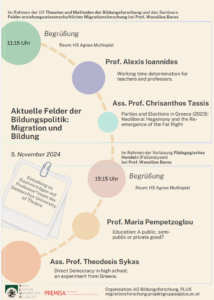
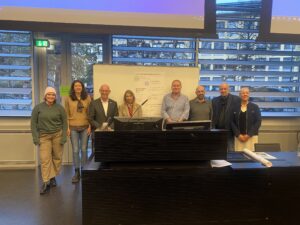
v.l.n.r BA. Annika Wastl, Dr. Aida Kell-Delic, Ass. Prof. Chrisanthos Tassis, Prof. Maria Pempetzoglou, Prof. Alexis Ioannidis, Ass. Prof. Theodosis Sykas, Prof. Wassilios Baros, MA Corinna Christmann
University of Ioannina in Collaboration with University Salzburg (PREMISA, Department of Educational Science)
International Symposion
(c) PREMISA PLUS Prof. Dr. Dr. h.c. Heinz Sünker (10.10.2024, Ehrendoktor an der Universität Ioannina)
v.l.n.r Prof. Sünker, Prof. Zaragkas, Prof. Nikoletta Tsitsanoudis-Mallidis, Prof. Moran-Ellis, Prof. Braches-Chyrek, Prof. Pantazis, Prof. Baros
Childhood Studies: Confronting Social and Educational Challenges
10 Oktober 2024, 12:00 – 14:00 p.m, Auditorium of the Department of Early Childhood Education
Prof. Dr. Rita Braches-Chyrek (University of Bamberg)
Deconstructing and decoding childhood: The (re)definition processes of early education
Prof. Dr. Jo Moran-Ellis (University of Sussex)
The Case for Intergenerational Alliances for Social Change
Prof. Dr. Heinz Sünker (University of Wuppertal)
Childhood Studies and Fighting Child Poverty in Late Capitalism
34th Conference of the Peace Psychology Forum
Heraklion (Crete), Greece May 16-17, 2024
on the topic
Conflict, flight and migration
– Call for Papers –
With Russia’s attack on Ukraine in February 2022, war is once again raging in Europe. This event not only marked a turning point in terms of peace within Europe, but also forced a large number of Ukrainian citizens to flee their home country. At the same time, precarious conditions in refugee camps and on the sea routes to Europe have persisted for years at Europe’s borders – especially on the island of Lesbos. Regarding the various current refugee and migration movements, the global political and economic circumstances are often ignored. The causes of migration and flight tend to be observed at an individual level or attributed to upheavals in the societies of origin. Such short-sighted explanations often go with stigmatization and narratives that are spread by the media in potential host countries, for example. Reflecting on the actual causes of conflicts and (refugee) migration as well as the scope of such circumstances offers the potential to examine the appropriateness of individual attitudes and positioning on the one hand, and to question widespread stigmas and narratives on the other hand.The following questions serve as points of reference for reflecting on the conditions under which conflict and migration dynamics arise and the associated problems and obstacles faced by those affected in the countries of origin as well as in the host countries, which can be addressed using theoretical and empirical approaches at both a micro and macro level:
o What is the conceptual relationship between the terms „conflict“, „flight“ and „migration“ in specialist academic and public-media discourses? How has their meaning developed or changed over the course of history?
o Which factors (on an individual, social and systemic level) need to be taken into account regarding adequate handling and/or assistance during/after conflicts?
o Which counseling-therapeutic or pedagogical-didactic concepts can contribute to support in the context of migration or flight experiences?
o What causes (refugee) migration and what obstacles do those affected face in the host country?
o Which (ideological) concepts of society/community promote the emergence and maintenance of restrictive border regimes?
o Which methodological approaches of peace psychology can prove fruitful in the area of „flight and migration“ and in dealing with conflicts?
o Which interdisciplinary links between psychology, educational science, sociology and cultural studies promise to provide new insights for peace research in this context?
Types of contributions and submission deadline
Presentation (25 minutes incl. discussion) Submissions with title, authors and abstract (max. 200 words)
Symposium (3-4 thematically related presentations, 90 minutes in total) Submission with title, organizers and a summary describing the symposium (max. 200 words) as well as titles, authors and summaries (max. 200 words) of the individual contributions.
Posters Submissions with title, authors and abstract (max. 200 words)Papers can be submitted in German and English.
Publication of the conference papers
In order to make the presentations accessible in the long term, the contributions will be published in an issue of the Journal of Political Psychology.
Information on the conference venue
The conference will take place at the Cultural Conference Center of Heraklion Crete on the island of Crete, Greece.
We are looking forward to welcoming you to Crete in 2024!
Conference homepage: in progress
Homepage of the Peace Psychology Forum – Social Media of the Peace Psychology Forum
Questions and suggestions
Prof. Dr. Wassilios Baros
Corinna Christmann, BA MEd
Johanna Heimbach, BA MA
Aida Kell-Delic, BA MA
Annika Wastl, BA
WS 2022/23
UV Globalisierung – Politik – Bildung:
Umgang mit globalen Krisen (offenes Wahlmodul B/C)
In der vergangenen Woche hat der griechische Abgeordnete und ehemalige Minister Prof. Dr. Evripidis Stylianidis auf Einladung der PLUS mehrere Vorträgseinheiten im Rahmen des Seminars Globalisierung – Politik – Bildung: Umgang mit globalen Krisen gehalten. Aus interdisziplinärer Perspektive wurden mit der wirtschaftlich-sozialen Krise von 2010-2018 in Griechenland und ihren Auswirkungen bis heute, der Gesundheitskrise durch Covid-19 und der aktuellen Energiekrise hochaktuelle Ereignisse beleuchtet. Ebenso ging es um die griechische Minderheitenpolitik in Thrakien (Nord-Griechenland). Die Vorträge wurden an der gesellschaftswissenschaftlichen und der rechtswissenschaftlichen Fakultät der PLUS unter Mitwirkung von Prof. Dr. Wassilios Baros und Prof. Dr. Rudolf Mosler abgehalten. Prof. Dr. Evripidis Stylianidis ist Professor für Verfassungsrecht mit Schwerpunkt Schutz der Minderheitenrechte an der European University of Cyprus. Sein Programm umfasste, jeweils mit anschließender Diskussion im Plenum, sechs Beiträge für Studierende im Grundstudium und einen Vortrag für Professor:innen und Doktorand:innen.
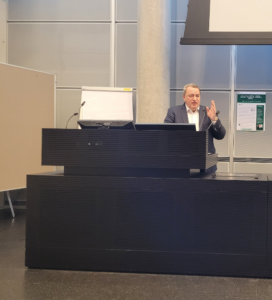
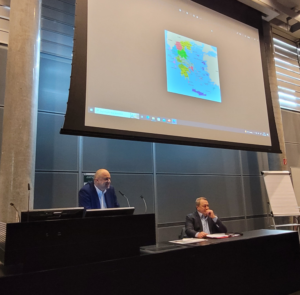
Im Zuge des ersten Teils der Vorträge am FB Erziehungswissenschaft stellte er etwa das Modell der offenen demokratischen Gesellschaft und der modernen Minderheitenpolitik in Griechenland vor, das in Thrakien entwickelt wurde. Hierbei lag der Schwerpunkt auf der Religionsfreiheit der muslimischen Minderheit, aber auch Bildungsprojekte und -perspektiven standen im Mittelpunkt der Veranstaltung. Außerdem wurde den weiteren Vorträgem thematisiert, wie Griechenland, u.a. in der Rolle als eines der 27 EU-Mitgliedstaaten, drei aufeinanderfolgende Krisen bewältigt hat: die wirtschaftlich-soziale Krise von 2010-2018, die Gesundheitskrise Covid-19 im Jahr 2020 bis heute und die aktuelle Energiekrise. Hierzu wurde ausführlich die europäische Energie-Diplomatie analysiert.
Die letzte Veranstaltung fand an der juridischen Fakultät statt. Als Verfassungsrechtler hielt er den Vortrag „Öffentlich-rechtliche Dimensionen des Einsatzes von künstlicher Intelligenz“. Hierbei erörterte er grundlegende Fragen hinsichtlich der Risiken und Chancen bei der Verwendung künstlicher Intelligenz im Rahmen staatlicher Aufgaben. Im Anschluss wurde der im Vortrag gebotene Input angeregt von dem Fachpublikum diskutiert.
Die Lehrveranstaltung wurde von einer großen Anzahl Studierender besucht. Sie hatten die Gelegenheit, mit Prof. Stylianidis über verschiedene rechtliche und (bildungs-)politische Fragen zu debattieren und mehr über den Umgang damit in Griechenland und Thrakien im Speziellen zu erfahren. Die Arbeitssprachen waren Deutsch und Englisch.
Salzburg, den 27.2.2023

